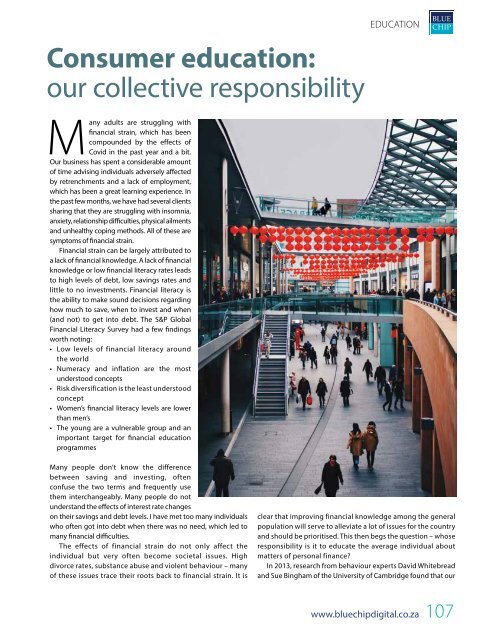Blue Chip Issue 81
Blue Chip is a quarterly journal for the financial planning industry and is the official publication of the Financial Planning Institute of Southern Africa NPC (FPI), effective from the January 2020 edition. Blue Chip publishes contributions from FPI and other leading industry figures, covering all aspects of the financial planning industry. Blue Chip takes this opportunity to wish the FPI a happy 40th anniversary. Congratulations!
Blue Chip is a quarterly journal for the financial planning industry and is the official publication of the Financial Planning Institute of Southern Africa NPC (FPI), effective from the January 2020 edition. Blue Chip publishes contributions from FPI and other leading industry figures, covering all aspects of the financial planning industry.
Blue Chip takes this opportunity to wish the FPI a happy 40th anniversary.
Congratulations!
You also want an ePaper? Increase the reach of your titles
YUMPU automatically turns print PDFs into web optimized ePapers that Google loves.
EDUCATION<br />
Consumer education:<br />
our collective responsibility<br />
Many adults are struggling with<br />
financial strain, which has been<br />
compounded by the effects of<br />
Covid in the past year and a bit.<br />
Our business has spent a considerable amount<br />
of time advising individuals adversely affected<br />
by retrenchments and a lack of employment,<br />
which has been a great learning experience. In<br />
the past few months, we have had several clients<br />
sharing that they are struggling with insomnia,<br />
anxiety, relationship difficulties, physical ailments<br />
and unhealthy coping methods. All of these are<br />
symptoms of financial strain.<br />
Financial strain can be largely attributed to<br />
a lack of financial knowledge. A lack of financial<br />
knowledge or low financial literacy rates leads<br />
to high levels of debt, low savings rates and<br />
little to no investments. Financial literacy is<br />
the ability to make sound decisions regarding<br />
how much to save, when to invest and when<br />
(and not) to get into debt. The S&P Global<br />
Financial Literacy Survey had a few findings<br />
worth noting:<br />
• Low levels of financial literacy around<br />
the world<br />
• Numeracy and inflation are the most<br />
understood concepts<br />
• Risk diversification is the least understood<br />
concept<br />
• Women’s financial literacy levels are lower<br />
than men’s<br />
• The young are a vulnerable group and an<br />
important target for financial education<br />
programmes<br />
Many people don’t know the difference<br />
between saving and investing, often<br />
confuse the two terms and frequently use<br />
them interchangeably. Many people do not<br />
understand the effects of interest rate changes<br />
on their savings and debt levels. I have met too many individuals<br />
who often got into debt when there was no need, which led to<br />
many financial difficulties.<br />
The effects of financial strain do not only affect the<br />
individual but very often become societal issues. High<br />
divorce rates, substance abuse and violent behaviour – many<br />
of these issues trace their roots back to financial strain. It is<br />
clear that improving financial knowledge among the general<br />
population will serve to alleviate a lot of issues for the country<br />
and should be prioritised. This then begs the question – whose<br />
responsibility is it to educate the average individual about<br />
matters of personal finance?<br />
In 2013, research from behaviour experts David Whitebread<br />
and Sue Bingham of the University of Cambridge found that our<br />
www.bluechipdigital.co.za<br />
107


















